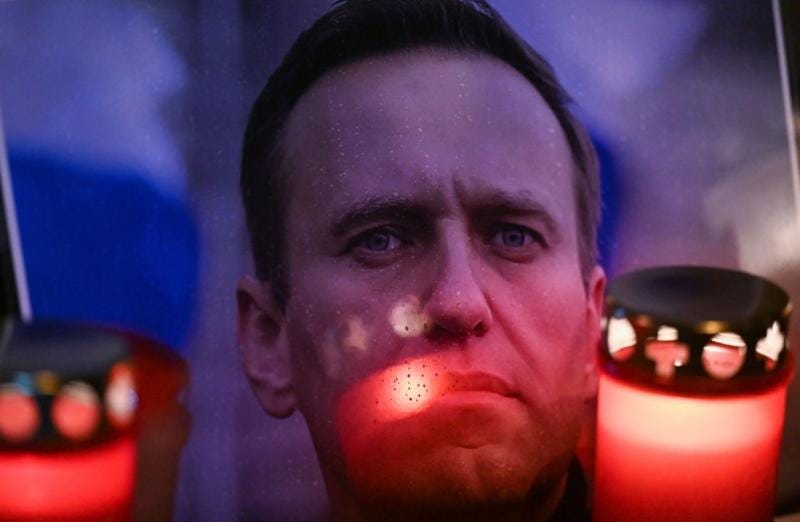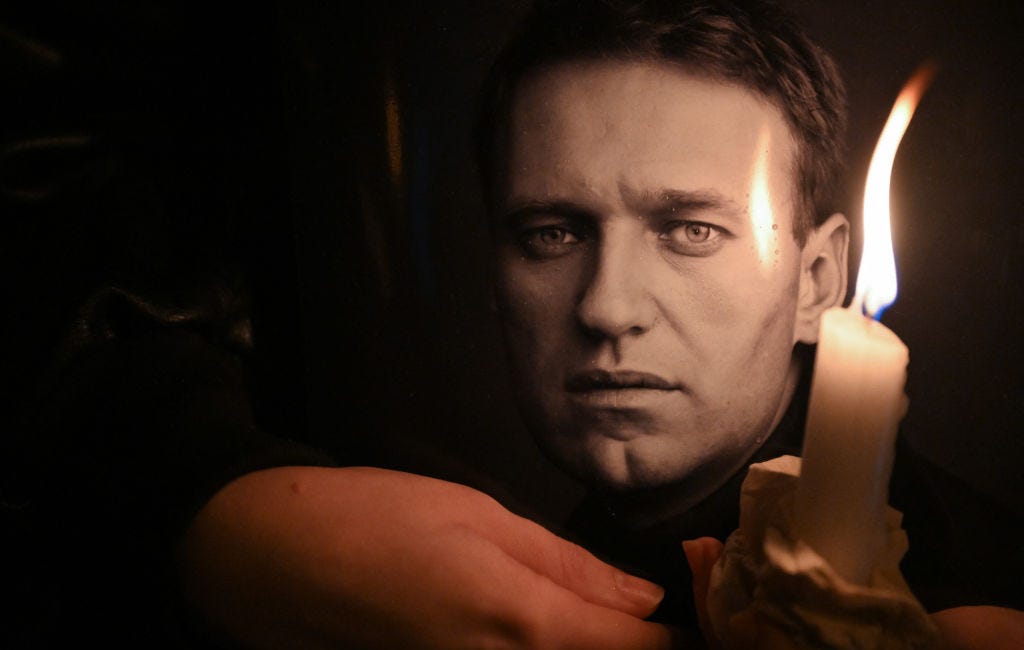“All the bridges have already been burned.” Ways of holding Russia to account have been exhausted
Why the West has no answer to Alexei Navalny’s death – and what it means for US and European politics.
By Grigor Atanesian. 16 February 2024.
Prior to Russia’s full-scale invasion of Ukraine, Alexei Navalny’s fate had prompted European and American sanctions and was a significant point of contention between the Kremlin and Western countries. But after two years of war, everything has changed. What might be the consequences for Moscow now?
Four years ago, Navalny’s poisoning in Siberia marred Russia's relations with Germany, where he was being treated. Yet despite the attempt on Navalny’s life, the occupation of Crimea, and Russian military operations in eastern Ukraine, Berlin was still keen to engage in active trade with Russia and purchase Russian gas.
US president Joe Biden said after meeting Putin in Geneva in 2021 that he’d warned the Russian leader of “devastating consequences” in the event of Navalny’s death behind bars.
On Friday, Biden made a short speech paying tribute to the courage of the Russian opposition figure, stating “Putin is responsible for Navalny’s death”.
However, when a journalist asked what would be the “devastating consequences,” Biden responded by saying: “That was three years ago. Since then, they have faced a hell of a lot of consequences.”
"We're contemplating what else can be done," he added. "We're looking at a whole number of options. That's all I'll say right now."
But it is hard to imagine more serious sanctions than those that have already been introduced in the wake of the war in Ukraine, says Dr. Ben Noble, associate professor of Russian politics at University College London, and co-author of the biography “Navalny: Putin's Nemesis, Russia's Future?”
“Navalny's death would have had a huge impact four or five years ago because it would have been moving the EU from a position of a wary dialogue to a much more open imposition of sanctions and hostility. But those bridges have already been burned.”
There will be lots of tough rhetoric from European countries, and maybe some new symbolic sanctions, he suggests. “It's very important for Western capitals to stand up and use strong language, if only to hold the Kremlin accountable in words,” he says. “If now, it's too late to save Navalny.”
Such sentiments have already been voiced – the German chancellor Olaf Scholz said Putin should “answer for what he’s done”, and the French president Emmanuel Macron laid the blame squarely with the Russian authorities.
Even in the recent past, Navalny’s death in a Russian prison could have had a serious impact on Moscow's relations with European Union countries, says Dr. Alex Clarkson, Lecturer in German and European & International Studies at King’s College London.
“Navalny's death would have had a huge impact four or five years ago because it would have been moving the EU from a position of a wary dialogue to a much more open imposition of sanctions and hostility,” Clarkson says. “But those bridges have already been burned.”
Now, after almost two years of the Russian war in Ukraine, relations between the Kremlin and EU countries (with the exception of Hungary) have been irreparably damaged.
Meanwhile, European countries are slowly but surely increasing the production of ammunition for the Ukrainian army and discussing how Europe can continue to support Kyiv without US involvement. In total, by January of this year, the European Union (as a bloc and as individual countries) had allocated or promised €144 billion for military and humanitarian aid to Ukraine — twice as much as the United States.
“I genuinely struggle to see what the Europeans can do beyond what they've already done,” Clarkson says.
Since 2022, Russia has overtaken previous leaders Iran and North Korea when it comes to the quantity of sanctions on trade, finance, and private individuals. The West and its allies have cut Russia off from credit, investment, and technologies, closed their markets to Russian exports, frozen Russian currency reserves, and are now discussing whether to hand them over to Ukraine. Hundreds of foreign companies have ceased operations in Russia. Yachts and mansions of Russian officials and oligarchs have been seized, and their bank accounts frozen.
The worry, Clarkson says, is that this total rupture with the West may have given the Russian authorities a free hand to ramp up repression against their opponents inside the country.
“That’s reminiscent of what happened to some regimes in the Middle East, like [that of] Hafez al-Assad or Saddam Hussein,” Clarkson says. “When their relations with the Europeans and particularly Americans broke, they went much more ruthlessly against domestic opposition.”
Navalny’s death may also have an impact on internal political debates in Europe, where many far-right parties and movements are united in their opposition to the European Union but take different stances on Russia.
“Two key pro-Russian movements are the Alternative for Germany and the Austrian Freedom Party,” says Clarkson. While the former is facing serious problems after a series of scandals, several polls put the far-right Freedom Party in front in the run-up to this autumn’s Austrian parliamentary elections.
This is the most serious challenge posed to European unity on supporting Ukraine and confronting Russia, Clarkson believes. More serious than Hungarian prime minister Viktor Orban, for example, whose opposition the EU leadership has got used to overcoming.
Navalny’s death will be an inconvenient fact for such movements and parties: it’ll be harder for them to say that Austria and Germany are slipping into dictatorship when the country they feel affection for has just seen its opposition figurehead die in a jail.
Campaigning for November’s US elections may also be impacted by Navalny’s death, believes Dr. Timothy M. Frye, Marshall D. Shulman Professor of Post-Soviet Foreign Policy at Columbia University’s Harriman Institute.
"Trump and his team's effort to normalise Russia will suffer a serious setback," says Frye. Donald Trump will find it harder to convince American voters and the Washington elite of the need to take a softer stance towards the Kremlin, he says.
The death of Navalny, Frye thinks, might even push Republicans in Congress to approve a new aid package for Ukraine, resolving almost two months of debate. They had blocked the measure, saying the record influx of migrants across the US border must be stopped before helping foreign countries. Trump urged his party to resist making a deal with the Democrats, adding that overseas aid should take the form of loans rather than unconditional assistance. The question now is whether Republican congressmen will disobey their party leader.
“Support for foreign aid to Ukraine remains quite popular in the United States. And it's only candidate Trump’s intervention that is preventing the Congress from passing the aid package,” Frye says. “Were it not for Donald Trump's opposition, I don't think it would be difficult to find a majority in both houses to pass the aid bill”.
Frye notes that the Republican Party leadership diverges from Trump over Russia, but rather than wash their dirty laundry in public, senior Republicans are trying to quietly smooth over the differences behind closed doors. Navalny’s death in prison might make such manoeuvres a lot harder.
Read this story in Russian here.
English version edited by Chris Booth.
BBC is blocked in Russia. We’ve attached the story in Russian as a pdf file for readers there.
Remembering Alexei Navalny
For over 15 years Alexei Navalny was one of Russia’s most prominent personalities and politicians. During that time many BBC News Russian journalists got to know him well. They reflect here on an extraordinary life cut short and a moment of profound loss for his family, his friends and for Russia.






